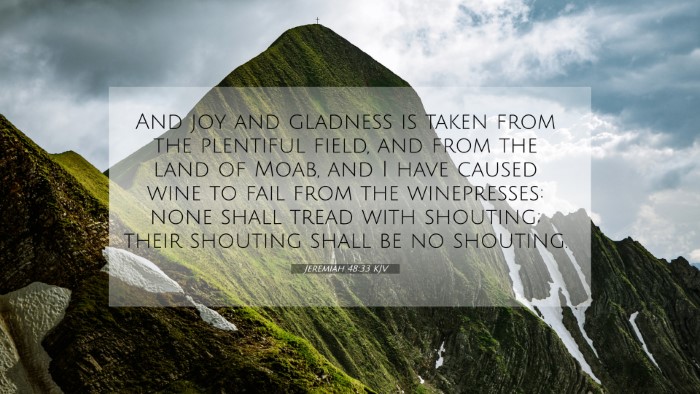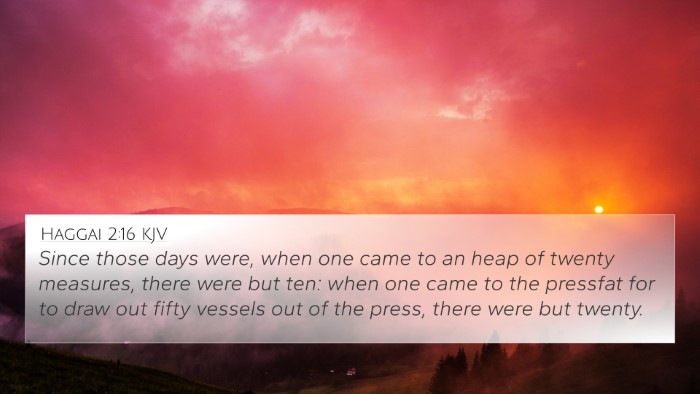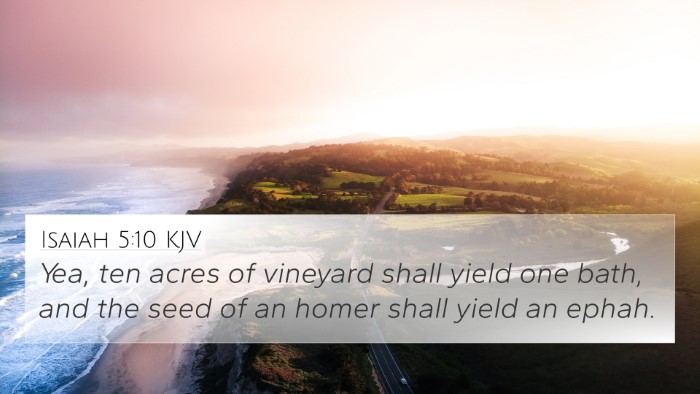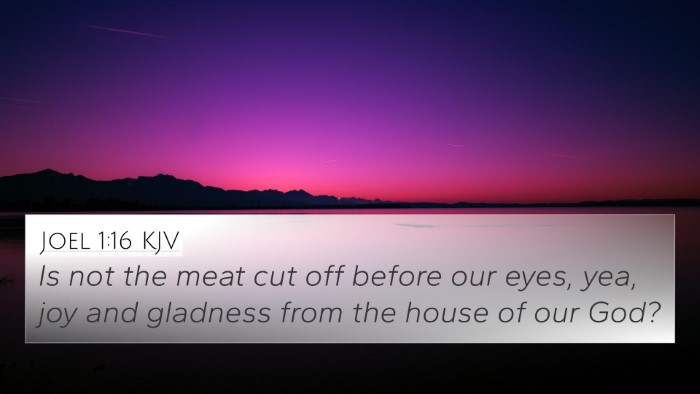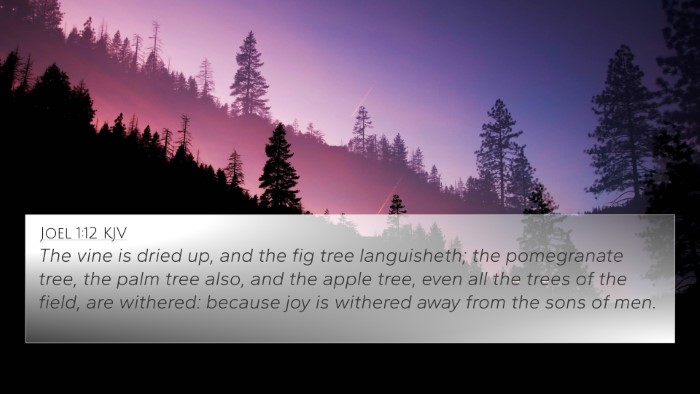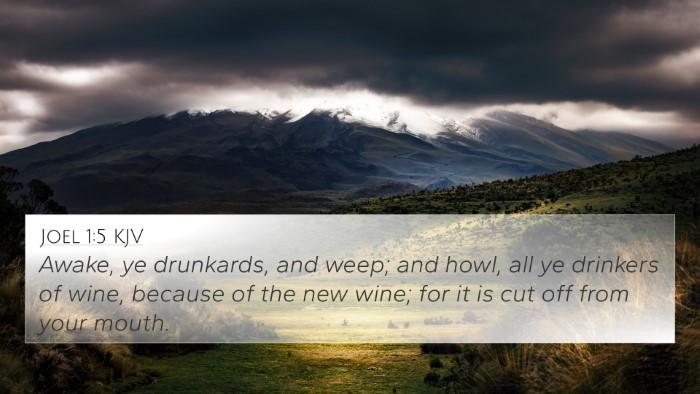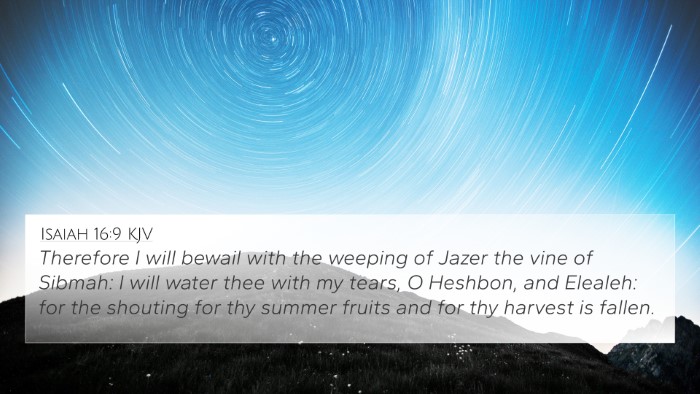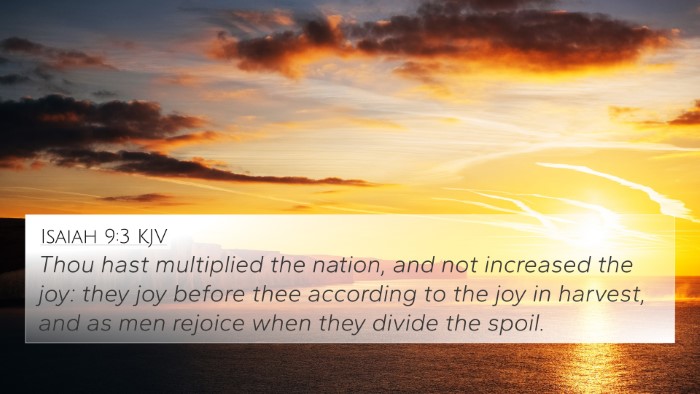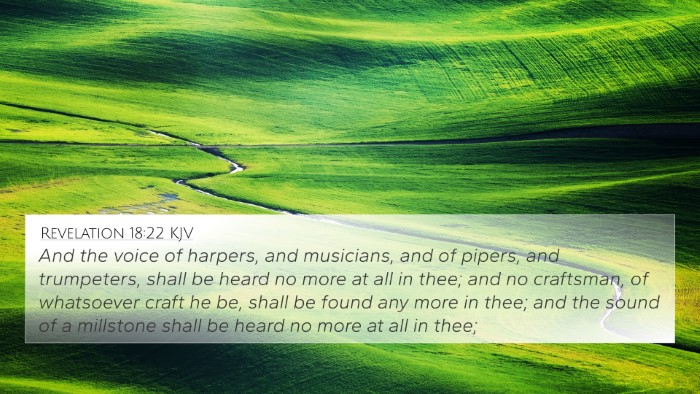Understanding Jeremiah 48:33
The verse Jeremiah 48:33 reads: "Joy and gladness are taken away from the plentiful field and from the land of Moab; and I have caused wine to fail from the winepresses: none shall tread with shouting; their shouting shall be no shouting." This verse is a powerful statement regarding the impending judgment upon Moab, a neighboring nation of Israel, symbolizing the loss of joy and prosperity.
Summary of the Verse Meaning
In Jeremiah 48:33, God communicates through the prophet Jeremiah about the desolation coming upon Moab due to their sins and idolatry. This passage emphasizes the stark reality of divine judgment, highlighting what happens when a nation turns from God. Moab, once a place of abundance and celebration, is depicted as losing its joy, particularly in the context of the winepress, which symbolizes both prosperity and spiritual fulfillment.
Insights from Public Domain Commentaries
Insights from notable commentaries include:
- Matthew Henry: He points out that the joy and gladness refer to the social and communal celebration that follows harvest time, indicating how the impending doom will strip the Moabites of their cultural identity and fellowship.
- Albert Barnes: Barnes elaborates on the imagery of wine and winepresses, which often symbolize abundance and joy in Scripture, suggesting that Moab's future is bleak and devoid of these blessings due to God's decree.
- Adam Clarke: Clarke emphasizes the seriousness of the loss indicated in this verse as a direct result of their misdeeds and idolatry, noting that God’s judgment is just and serves as a warning to others.
Cross-References for Jeremiah 48:33
In studying Jeremiah 48:33, several cross-references illuminate the themes of loss and judgment:
- Isaiah 16:10: "And gladness is taken away, and joy out of the plentiful field; in the vineyards there shall be no singing, neither shall there be shouting." This verse mirrors the sentiments of Jeremiah 48:33.
- Amos 5:11: "Forasmuch therefore as your treading is upon the poor, and ye take from him burdens of wheat: ye have built houses of hewn stone, but ye shall not dwell in them; ye have planted pleasant vineyards, but ye shall not drink wine of them." Here, God declares that the unjust will not enjoy the fruits of their labor.
- Joel 1:10: "The field is wasted, the land mourneth; for the corn is wasted: the new wine is dried up, the oil languisheth." Joel similarly speaks of devastation leading to mourning.
- Jeremiah 25:10: "Moreover I will take from them the voice of mirth, and the voice of gladness, the voice of the bridegroom, and the voice of the bride, the sound of the millstones, and the light of the candle." This verse discusses the complete removal of joy due to God’s judgment.
- Habakkuk 3:17: "Although the fig tree shall not blossom, neither shall fruit be in the vines; the labor of the olive shall fail, and the fields shall yield no meat..." Habakkuk conveys a similar despair regarding agricultural produce and the loss of joy.
- Psalm 137:1-3: "By the rivers of Babylon, there we sat down, yea, we wept, when we remembered Zion. We hanged our harps upon the willows..." This reflects the sorrow of a people stripped of joy in a foreign land, paralleling Moab’s loss.
- Lamentations 2:5: "The Lord was as an enemy: he hath swallowed up Israel, he hath swallowed up all her palaces: he hath destroyed his strongholds..." This verse showcases the sorrow that comes through divine opposition, akin to Moab's despair.
- Micah 2:4: "In that day shall one take up a parable against you, and lament with a doleful lamentation, and say, We be utterly spoiled: he hath changed the portion of my people..." Micah's message resonates with the themes of judgment and loss.
Thematic Connections
The overarching theme in Jeremiah 48:33 relates to judgment, loss, and the absence of joy as a consequence of sin. This theme of judgment is prevalent throughout the Bible, leading to rich thematic interconnections. The prophets repeatedly declare God’s righteousness in judging nations that turn away from Him.
Instructions for Biblical Study
When studying Jeremiah 48:33, you may wish to:
- Utilize a Bible concordance: This will help in finding related verses quickly.
- Explore a Bible cross-reference guide: Look for cross-references that highlight the relationships between different scriptures.
- Engage in cross-reference Bible study: Seek out themes and parallels in both the Old and New Testaments.
- Use Bible reference resources for thematic studies: This can help identify notable connections regarding judgment and restoration.
- Consider Bible chain references: Trace themes continuously throughout scripture.
Applications for Daily Life
The message of Jeremiah 48:33, like many scripture passages, serves as a poignant reminder for personal reflection. It challenges believers to consider the state of joy and gladness within their lives and communities, urging vigilance against complacency in faith.
Conclusion
Through a careful examination of Jeremiah 48:33 and its connections to other scriptures, we uncover profound truths about divine judgment and the restoration of joy. By utilizing tools for Bible cross-referencing and thematic study, readers can deepen their understanding of scripture and its applicability to their lives.


